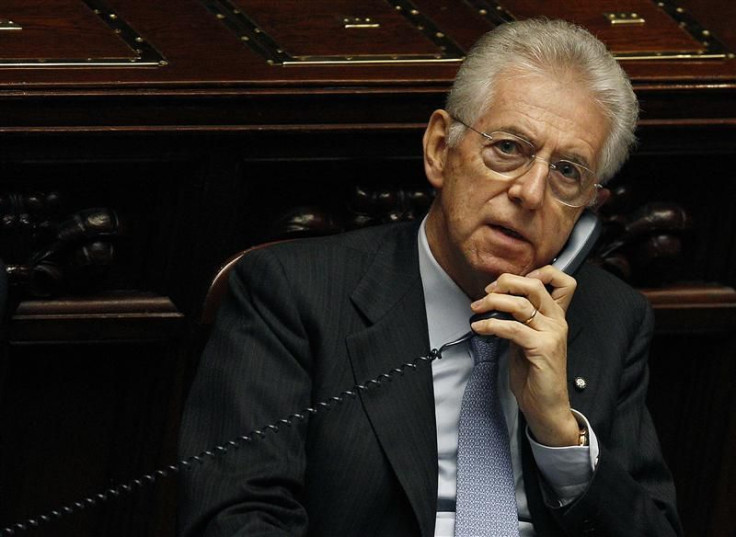Italy's Monti Reviews Nation's Finances Before EU Meetings This Week

Newly installed Prime Minister Mario Monti got straight to work at the weekend, reviewing Italy's parlous finances before a round of meetings in coming days with European leaders to discuss the growing Eurozone debt crisis.
Monti easily won confidence votes in record time in both houses of parliament last week, just days after his predecessor Silvio Berlusconi lost his majority and quit -- the latest European Union premier to fall victim to the Europewide economic emergency.
The new government of technocrats, supported by almost all Italy's main parties, will focus first on enacting austerity measures passed by Berlusconi that aim to balance the budget in 2013 and halt the rise in Italy's monumental debt pile.
But with the economy looking certain to slow, additional measures will be needed, and Monti, who is also economic minister, spent his first hours in office reviewing the latest data.
Italian newspapers said Sunday that new budget measures were likely to be disclosed within two weeks, with a property tax abolished by Berlusconi set to return, plus moves to cut payroll taxes to boost employment on the one hand and to tackle tax evasion on the other hand.
As the broad outlines of his program emerge, Monti will travel to Brussels on Tuesday for talks with Herman Van Rompuy, president of the European Council, and Jose Manuel Barroso, president of the European Commission.
On Thursday, Monti will have lunch in Strasbourg, France, with French President Nicolas Sarkozy and German Chancellor Angela Merkel.
Europe's two main power brokers showed growing exasperation with Berlusconi, believing he had failed to grasp the severity of the crisis, and there was obvious relief in Paris and Berlin over the arrival of Monti, a former EU commissioner.
Up until now Italy was part of the problem, now it is part of the solution, said Daniel Gros, the head of the Center for European Policy Studies in Brussels.
Eurobond Divisions
But Monti will find himself at odds with Merkel over ways out of Europe's financial crisis, which has roiled markets and raised fears for the future of the euro single currency.
While Germany has rejected calls for common Eurozone debt issuance, Monti enthusiastically endorsed the measure before taking office, writing in the Financial Times in July that eurobonds are the only answer to Europe's crisis.
He is only likely to make headway on this issue if he can show Europe that he has a firm grasp on Italy's finances and a clear vision of how to cut its debt, currently running at a perilous 120 percent of gross domestic product.
Although he secured huge support in last week's vote from a parliament spooked by a sudden jump in Italian borrowing costs, he could face a battle as he tries to win backing for greater austerity or implementing a pledge to liberalize the hidebound economy.
Berlusconi said on Sunday he expected Monti to stay in office until the end of the legislature in 2013. While Berlusconi was ready to back a new property tax, the former prime minister warned that other measures, such as a mooted wealth tax, were not acceptable.
The government is made up of highly competent technocrats. That does not mean they have carte blanche on everything. We will be very attentive on every single measure, he told the Corriere della Sera newspaper.
Monti cannot ignore us. [My party] is the biggest party in parliament and will be an irreplaceable point of reference for this government, he added.
(Editing by Tim Pearce)
© Copyright Thomson Reuters 2024. All rights reserved.





















